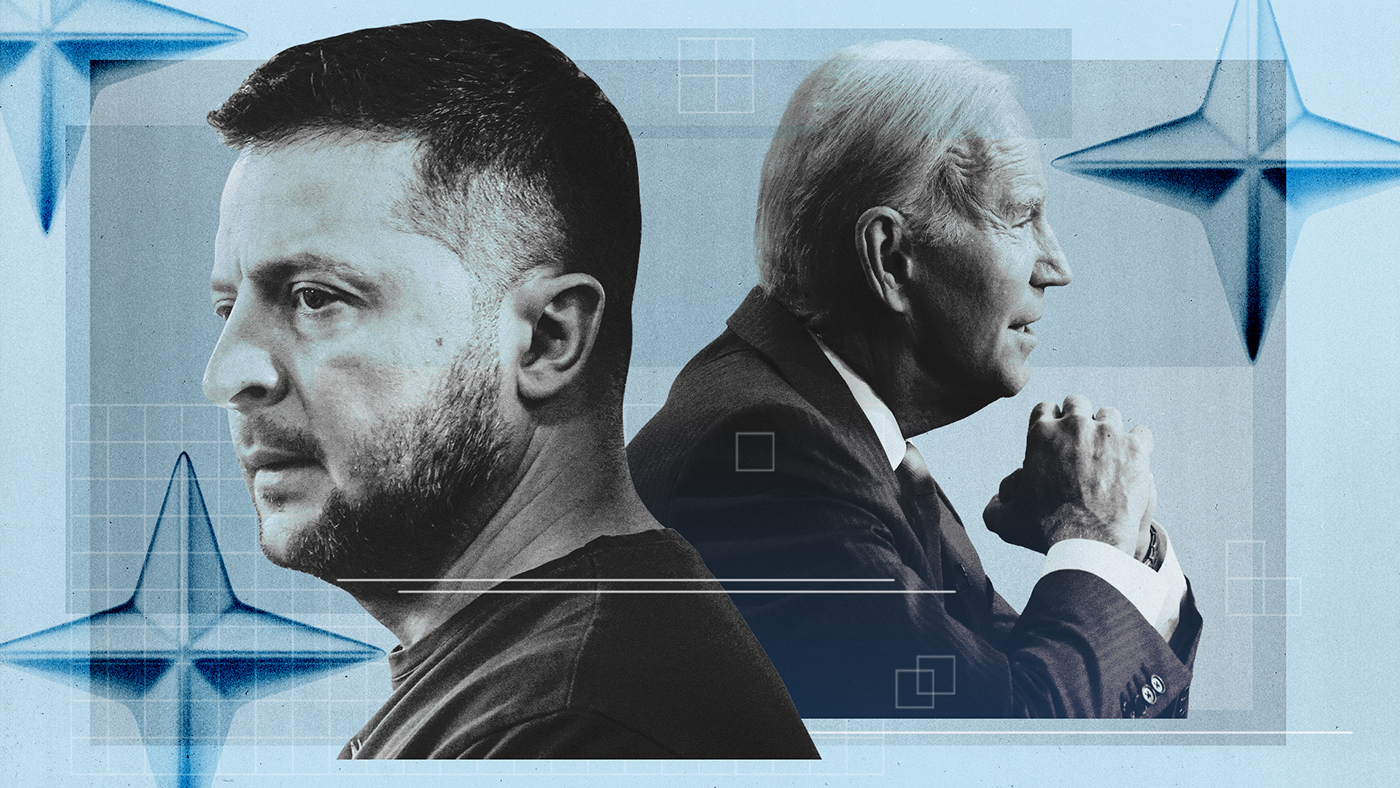Will Biden and Zelenskyy's NATO meeting resolve Ukraine's frustrations?
As NATO leaders gather, all eyes are on a face-to-face between the presidents of America and Ukraine


A free daily email with the biggest news stories of the day – and the best features from TheWeek.com
You are now subscribed
Your newsletter sign-up was successful
Heads of state from across NATO's 31 member nations have gathered in Vilnius, Lithuania this week for the Cold War-era alliance's latest global summit. There, all eyes are on Ukraine as it continues to fight off a more than year-long invasion effort by Russia, while President Volodymyr Zelenskyy makes an emphatic case for his country to be officially admitted into NATO's ranks.
In one of its first acts of the summit, NATO on Tuesday announced a massive, three-part aid package for Ukraine, including "the most comprehensive defence plans since the end of the Cold War" that presents "a clear path towards its membership in NATO," Secretary General Jens Stoltenberg said in a statement. Significant as it may be, the NATO plan was met initially with pointed skepticism from Zelenskyy himself, who criticized it as "unprecedented and absurd" for its lack of a concrete timeline for Ukraine's membership aspirations. Just hours later, Zelenskyy took a more moderate tone, lauding the newly created "NATO-Ukraine Council" as an "instrument of integration" into the global body, while acknowledging that "Ukraine cannot become a member of NATO while the war is ongoing."
Notably, Zelenskyy's pivot toward moderation came the same day as he was scheduled to meet with American President Biden, who has helped spearhead much of the West's ongoing aid to Ukraine. But can a face-to-face meeting between these two world leaders truly quell Ukraine's growing frustration with what it sees as NATO's half-measures?
The Week
Escape your echo chamber. Get the facts behind the news, plus analysis from multiple perspectives.

Sign up for The Week's Free Newsletters
From our morning news briefing to a weekly Good News Newsletter, get the best of The Week delivered directly to your inbox.
From our morning news briefing to a weekly Good News Newsletter, get the best of The Week delivered directly to your inbox.
What are the commentators saying?
"Zelensky's tone sitting next to President Biden and an array of American national security officials on Wednesday was starkly different" than the previous day's frustrations, The New York Times' David Sanger reported. Biden himself acknowledged Ukraine's predicament publicly during a summit news conference, saying "the frustration, I can only imagine." But, Biden promised, "the United States is doing everything we can to get you what you need as rapidly as we can get it to you." Behind closed doors, however, Biden is expected to be "straightforward" with Zelenskyy, predicted National Security Advisor Jake Sullivan. Sullivan's own interaction with a Ukrainian activist earlier on Wednesday — in which he insisted that "the American people do deserve a degree of gratitude" for their support for Ukraine — offered "perhaps, a preview of how Biden will respond to Zelenskyy's frustrations later on in the day," CNN said.
No matter the public comity in their pre-meeting appearance, Biden appeared pointedly aware of — and annoyed with — any preoccupation with a concrete countdown to Ukraine's NATO admission, offering what the Independent deemed a "sarcastic swipe at the press" when Zelenskyy was asked how soon he'd like Ukraine to become a NATO member after the war ends. "An hour and 20 minutes," Biden quipped, preempting any answer from his counterpart. "You guys ask really insightful questions," he added.
Though NATO's priority this week has been to project a solid, unified front of support for Ukraine's war effort itself, "there's been more caution inside the summit itself, especially from Biden, who has explicitly said he doesn't think Ukraine is ready to join NATO," AP reported, citing "concerns that the country's democracy is unstable and its corruption remains too deeply rooted." Nevertheless, by all indications, Biden and Zelenskyy's conversation seemed to have quelled the most immediate concerns between Ukraine and the rest of the global body.
"A very good, powerful meeting," Zelenskyy tweeted after he and the president concluded their talk, heralding it as "at least twice as long as planned, and it was as meaningful as it needed to be."
A free daily email with the biggest news stories of the day – and the best features from TheWeek.com
"We clearly see how to end this war with our common victory," he concluded. "Thank you, Mr. President!"
What comes next?
For the time being, the nebulous relationship between NATO and Ukraine seems to be contained within the context of the country's concrete war needs as it repels Russia's invasion. "This process will ensure that the military assistance we provide Ukraine to defend itself against Russian aggression continues to be part of a long-term investment in Ukraine's future force," National Security Counsel Europe Senior Director Amanda Sloat said. "We'll focus on ensuring Ukraine has a sustainable fighting force capable of defending Ukraine now and deterring Russian aggression in the future."
Crucially, both Biden and Zelenskyy must contend not only with the international ramifications stemming from this latest meeting, but with the domestic fallout, as well. "There are now fears among Ukrainian decision-makers that Germany and others want to use potential NATO membership as a bargaining chip in any future peace talks with Russia," one Ukrainian official told Politico, highlighting the pressures Zelenskyy is facing at home. Meanwhile, "a number of Republicans in Congress, and some GOP candidates vying for the party's presidential nomination, have begun to question the need for more funding for Ukraine" from the United States, CBS noted.
While America's relationship with Ukraine still "poses major questions both domestically and internationally" after Wednesday's meeting between Biden and Zelenskyy, "we can at least say one thing: The GOP's march away from support for Ukraine has halted," countered The Washington Post's Aaron Blake. "It's true that a strong majority of congressional Republicans have supported and appear to continue to support Ukraine," Blake continued, "but we've also seen how much force the pull of the base can have in today's GOP."
That base seems less inclined to pull the U.S. away from supporting Ukraine for the time being. But, if recent bombastic statements from former President Donald Trump are any indication, a potentially significant portion of the GOP might not feel that way for long.
Rafi Schwartz has worked as a politics writer at The Week since 2022, where he covers elections, Congress and the White House. He was previously a contributing writer with Mic focusing largely on politics, a senior writer with Splinter News, a staff writer for Fusion's news lab, and the managing editor of Heeb Magazine, a Jewish life and culture publication. Rafi's work has appeared in Rolling Stone, GOOD and The Forward, among others.
-
 Britain’s ex-Prince Andrew arrested over Epstein ties
Britain’s ex-Prince Andrew arrested over Epstein tiesSpeed Read The younger brother of King Charles III has not yet been charged
-
 Political cartoons for February 20
Political cartoons for February 20Cartoons Friday’s political cartoons include just the ice, winter games, and more
-
 Sepsis ‘breakthrough’: the world’s first targeted treatment?
Sepsis ‘breakthrough’: the world’s first targeted treatment?The Explainer New drug could reverse effects of sepsis, rather than trying to treat infection with antibiotics
-
 Witkoff and Kushner tackle Ukraine, Iran in Geneva
Witkoff and Kushner tackle Ukraine, Iran in GenevaSpeed Read Steve Witkoff and Jared Kushner held negotiations aimed at securing a nuclear deal with Iran and an end to Russia’s war in Ukraine
-
 ‘The forces he united still shape the Democratic Party’
‘The forces he united still shape the Democratic Party’Instant Opinion Opinion, comment and editorials of the day
-
 ‘The mark’s significance is psychological, if that’
‘The mark’s significance is psychological, if that’Instant Opinion Opinion, comment and editorials of the day
-
 The ‘mad king’: has Trump finally lost it?
The ‘mad king’: has Trump finally lost it?Talking Point Rambling speeches, wind turbine obsession, and an ‘unhinged’ letter to Norway’s prime minister have caused concern whether the rest of his term is ‘sustainable’
-
 Is the American era officially over?
Is the American era officially over?Talking Points Trump’s trade wars and Greenland push are alienating old allies
-
 Trump’s Greenland ambitions push NATO to the edge
Trump’s Greenland ambitions push NATO to the edgeTalking Points The military alliance is facing its worst-ever crisis
-
 Can Starmer continue to walk the Trump tightrope?
Can Starmer continue to walk the Trump tightrope?Today's Big Question PM condemns US tariff threat but is less confrontational than some European allies
-
 Trump considers giving Ukraine a security guarantee
Trump considers giving Ukraine a security guaranteeTalking Points Zelenskyy says it is a requirement for peace. Will Putin go along?
